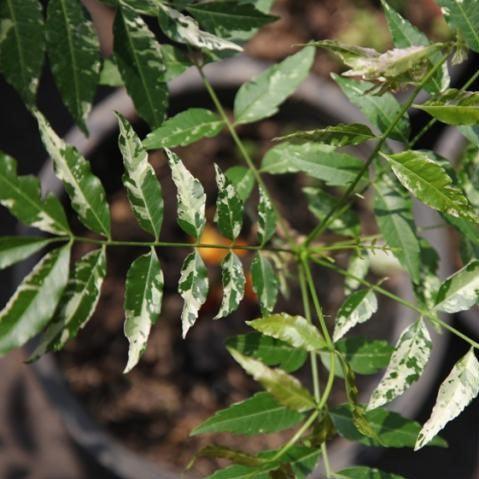

Description
- Common name:
- Variegated Neem
- Regional name:
- Marathi - Kadu Limba, Hindi- Neem, Bengali - Neem, Gujarati - Limba, Tamil - Vepa, Telugu - Vepa, Malayalam - Vepu Maram, Sanskrit - Nimba
- Category:
- Trees, Medicinal Plants
- Family:
- Meliaceae or Neem family
- Light:
- Sun growing
- Water:
- Requires less
- Primarily grown for:
- Foliage
- Flowering season:
- March, April, May, June, July
- Flower or Inflorescence color:
- White
- Foliage color:
- Variegated, Green, Cream or off white
- Plant Height or length:
- 6 to 8 meters
- Plant Spread or Width:
- 4 to 6 meters
- Plant Form:
- Spreading, Upright or Erect
-
Plant Description:
- The variegated neem tree (Azadirachta indica variegata) is a cultivar of the Azadirachta indica species, also known as the Indian neem tree. It is a tropical evergreen tree that is native to India and Pakistan. The variegated cultivar has green and yellow leaves, giving it a distinctive coloration compared to the typical green leaves of the species. It can grow up to 30 ft tall and 15 ft wide with a dense rounded canopy. The leaves, bark, and seeds of the neem tree have been used in traditional medicine for centuries. It is considered a hardy plant, able to adapt in a variety of soil conditions and it is relatively drought-tolerant. It is also prized for its ability to repel insects, making it a popular choice for use in organic gardening.
-
Growing tips:
-
The variegated neem tree is relatively easy to care for and can tolerate a wide range of growing conditions. Here are a few tips to help ensure its health and vitality:
- Light: It prefers full sun to partial shade, but can also tolerate some shade.
- Water: It is drought-tolerant and can go long periods without water. Water it when the soil is dry to touch, but don't over-water.
- Soil: It can tolerate a wide range of soil types, but prefers well-draining soil with a neutral to slightly acidic pH.
- Temperature: The variegated neem tree can tolerate temperatures as low as 30 degrees Fahrenheit, but is typically grown as a tropical or subtropical tree, and should be protected from prolonged freezing temperatures.
- Fertilizer: It is not particularly heavy feeder and fertilization is not required, but if needed, it can be fertilized with a balanced fertilizer during growing season.
Pruning: it can be trimmed to shape or control size as needed, but it's not necessary to prune it regularly. Propagation: it can be propagated through seeds and cuttings.
The variegated neem tree is also known for its ability to repel insects, so it can be a good choice for use in an organic garden to keep pests at bay.
-
Benefits:
-
The variegated neem tree, like other members of the Azadirachta indica species, is highly valued for its medicinal properties and has been used in traditional medicine for centuries. Some of the benefits and uses of the neem tree include:
- Insect repellent: The leaves and bark of the neem tree contain compounds that are toxic to many types of insects, making it an effective natural insect repellent.
- Pesticide: Neem oil can be extracted from the seeds of the neem tree, and it is a common ingredient in organic pesticides and fungicides.
- Antifungal: Neem oil has antifungal properties, which makes it useful in treating fungal infections such as athlete's foot and ringworm.
- Antiviral: Neem leaf extract has been found to have anti-viral properties and has been traditionally used to treat viral infections such as chickenpox and measles.
- Anti-inflammatory: Neem leaf extract can help reduce inflammation in the body, making it beneficial in treating conditions such as arthritis and eczema.
- Oral health: Neem twigs have been traditionally used as a toothbrush and mouthwash due to its anti-bacterial properties.
It's worth noting that many of these benefits are based on traditional uses and more scientific research is needed to confirm the medicinal properties of the neem tree. It's not recommended to take it as a supplement or as a medicine without consulting a doctor.
